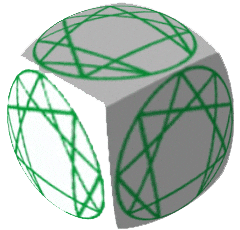You also have in-built connections to the Enneagram styles of your mother and father – called parental points – and these are almost as influential as the other connecting points. When you introjected your parents you also assimilated their Enneagram styles, and now you carry both the pitfalls and the potentials of their styles within you.
This can take different forms. Some people’s parental points have no inherent connection to their core Enneagram style. A One, for instance, has built-in connections to Seven and Four (Connecting points) as well as Nine and Two (wings). If, in addition, the One’s mother was an Eight and his father was a Five he would have an Eightish side to his character as well as a Five streak. Otherwise Eight and Five have no direct connection to his core style of One.
Some people’s parental points overlap with their other built-in connections. A One whose father is a Nine will have an intensified connection to Nine – his own wing – than if his father was, say, a Five. If the One’s mother is also a One, he will experience his own Oneness with an extra intensity, sort of “double strength.”
There are other variations. If you had only one parent, then the mark of that parent’s Enneagram style will be stronger. If you were raised by your mother and never knew your father, your mother’s Enneagram style would be more evident in your behavior. Your missing father might be with you, but in a paradoxical way: you would carry the feeling of his absence and replicate that absence in your present relationships with men.
If your grandparents raised you, then their Enneagram styles would be within you. If you rejected your father, but idolized your grandfather, then you might have a deeper connection to his Enneagram style than to your father’s. If your older brother was a surrogate parent then you might carry his Enneagram style more strongly.
Depending on your history, one or both of your parental points could be a shadow. If you had a troubled, conflicted relationship with your mother, you would tend to dislike or deny in yourself whatever reminded you of her. If the relationship later improved, you would begin to experience the high side of her Enneagram style within you.
This might sound confusing but even without psychotherapy it is many people’s natural experience. If you had a difficult relationship with a parent and that relationship later improved, you probably began to appreciate qualities about the parent that you had formerly disliked. Those same qualities are within you and are among your potential resources.



